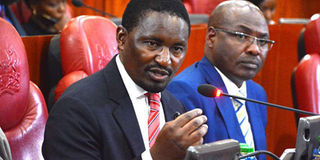Sh7bn bad maize scandal rocks cereals board

Agriculture CS Mwangi Kiunjuri and Livestock PS Harry Kimutai (right) when they appeared before the Senate Ad Hoc Committee on maize crisis on October 31, 2018. PHOTO | JEFF ANGOTE | NATION MEDIA GROUP
What you need to know:
Senators demand destruction of contaminated food before it reaches homes
The government may have lost about Sh7.6 billion through the procurement of maize after four million bags in the cereals board depots have been found unfit for human consumption.
According to the Kenya Bureau of Standards (Kebs), the maize, which is discoloured and contaminated with mycotoxins and fumonisin, is part of the six million 90-kilogramme bags that the government bought during last year’s harvest to boost its national strategic reserves.
NATIONAL DISASTER
Dr Henry Rotich, a senior manager at Kebs, told a Senate ad hoc committee meeting in Nairobi that 254 samples were tested in all the silos and that only 94 had complied with the safety standards.
“Our report is true and we stand by it,” he told the senators.
Agriculture Cabinet Secretary Mwangi Kiunjuri told the committee that more than 4.4 million bags of white maize were imported illegally during the duty waiver period early last year when the government declared drought a national disaster.
INFLATED PRICES
An inter-ministerial committee was formed with membership drawn from the Presidency, the Treasury, Agriculture ministry, NCPB, Kenya Revenue Authority and Kebs, to address the problem of inflated maize flour prices. The duty waiver period was to last four months from May 2, last year, when the gazette notice was issued to merchants and millers to import the commodity.
The committee chaired by Uasin Gishu Senator Margaret Kamar urged Mr Kiunjuri to deal with the situation immediately to ensure that the contaminated maize is not accessed and consumed.
QUALITY ASSURANCE
“I would have been happier if the NCPB, through its quality assurance department, acted on the Kebs letter,” Prof Kamar said adding: “What is in the stores in Eldoret, for instance, is a mixture of what was bought from farmers as well as imports.”
In its October 5 letter to the NCPB, the acting Kebs managing director, Mr Albin Sang, said that of the tests carried out on the maize stored in the silos across the country, only 36.7 per cent was safe.
However, Mr Kiunjuri said he could not rely on the Kebs report to make a decision, which may include destroying the contaminated maize.
STEEL BROOM
“This issue is so sensitive. It affects you and me. Officers in the relevant organs such as the Government Chemist, Kenya Plant Health Inspectorate (Kephis), and Kenya Livestock Research Organisation (Kalro) must be held personally responsible for this,” Mr Kiunjuri said.
Bungoma Senator Moses Wetang’ula, who is the vice-chairman of the committee, said: “If I were you, I would buy a steel broom and sweep all the corners of NCPB.”
Though Mr Kiunjuri said that he only got to know of the Kebs letter during the meeting with the committee, Mr Sang said he had presented it to the technical officers at the ministry.
WASTING TIME
The committee rejected Mr Kiunjuri’s proposal to appoint a task force to look into the suitability of maize in the stores, saying that the Kebs report was sufficient.
“The news we are getting is not good for the country. We have seen sugar, and milk, among other products, destroyed on the recommendations of Kebs reports. Why not act on this one? If I were you, I would not be wasting time on task forces,” Mr Wetang’ula said.
But the CS said the bad maize had been downgraded for other uses.





